高中英语人教版必修一Unit 2 English around the world grammar祈使句变间接引语课件(50张)
文档属性
| 名称 | 高中英语人教版必修一Unit 2 English around the world grammar祈使句变间接引语课件(50张) | 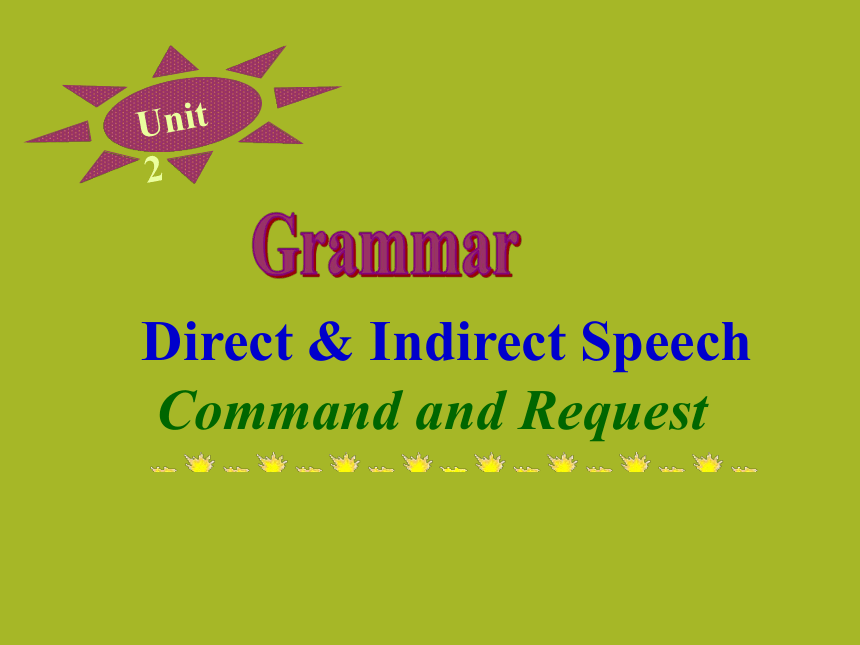 | |
| 格式 | zip | ||
| 文件大小 | 2.0MB | ||
| 资源类型 | 教案 | ||
| 版本资源 | 人教版(新课程标准) | ||
| 科目 | 英语 | ||
| 更新时间 | 2020-05-08 18:42:30 | ||
图片预览

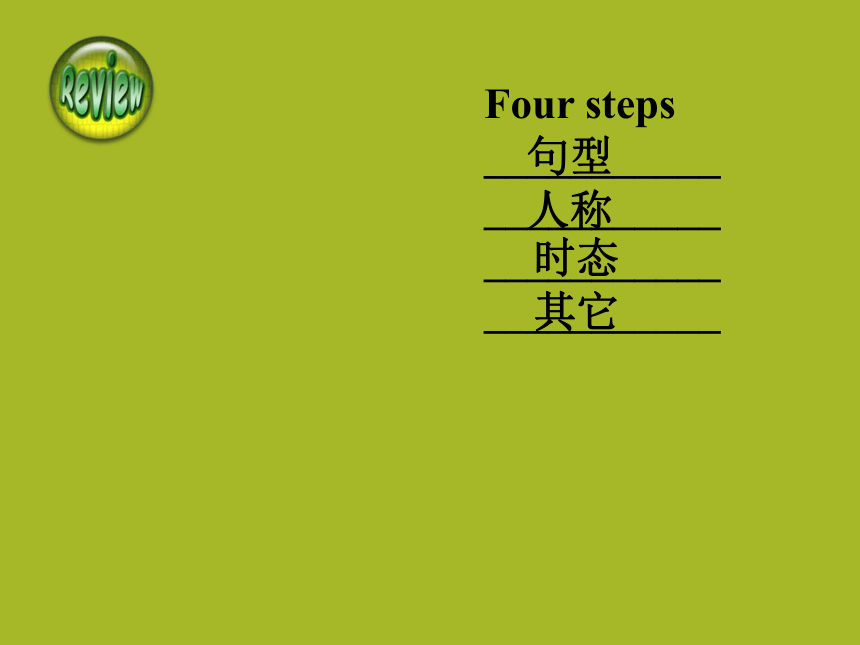
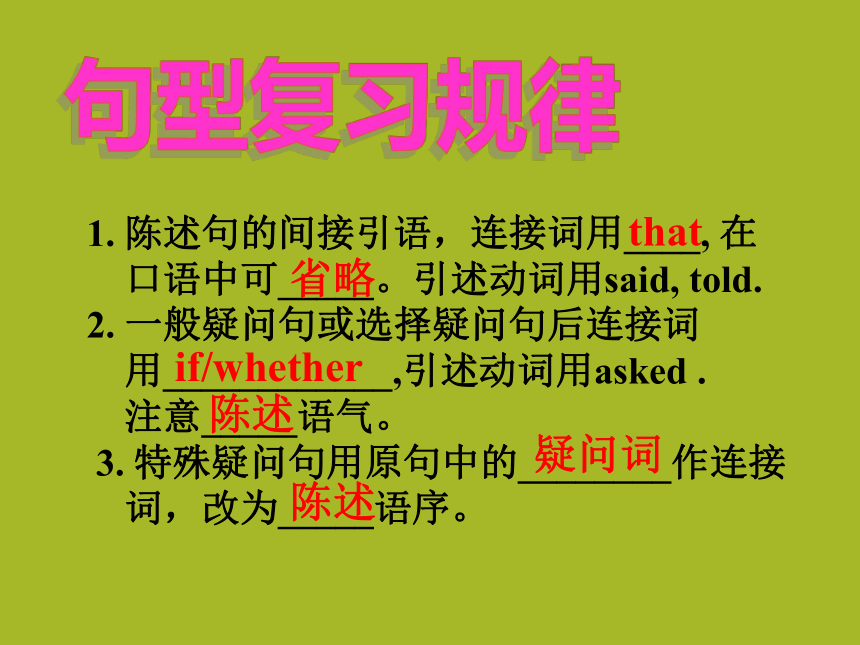
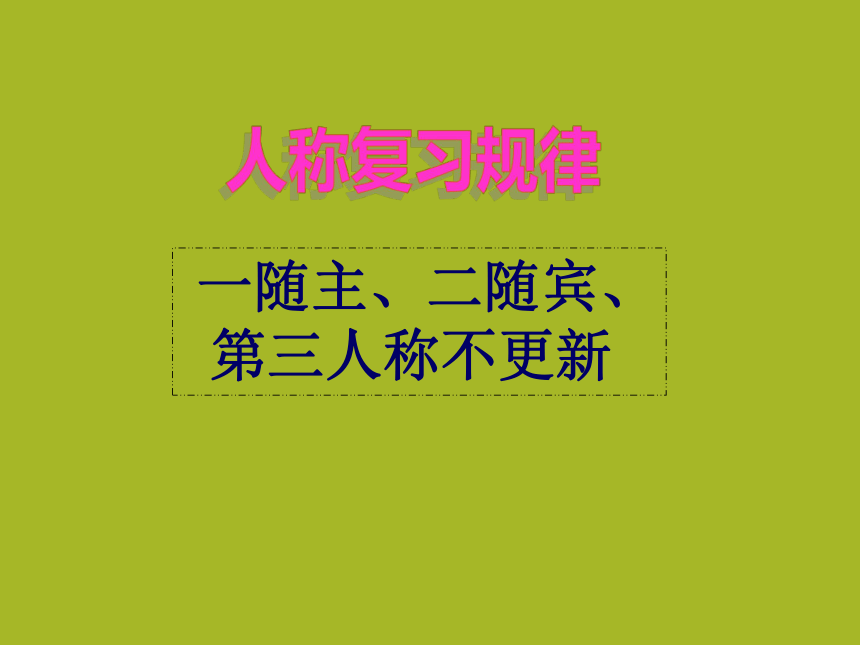
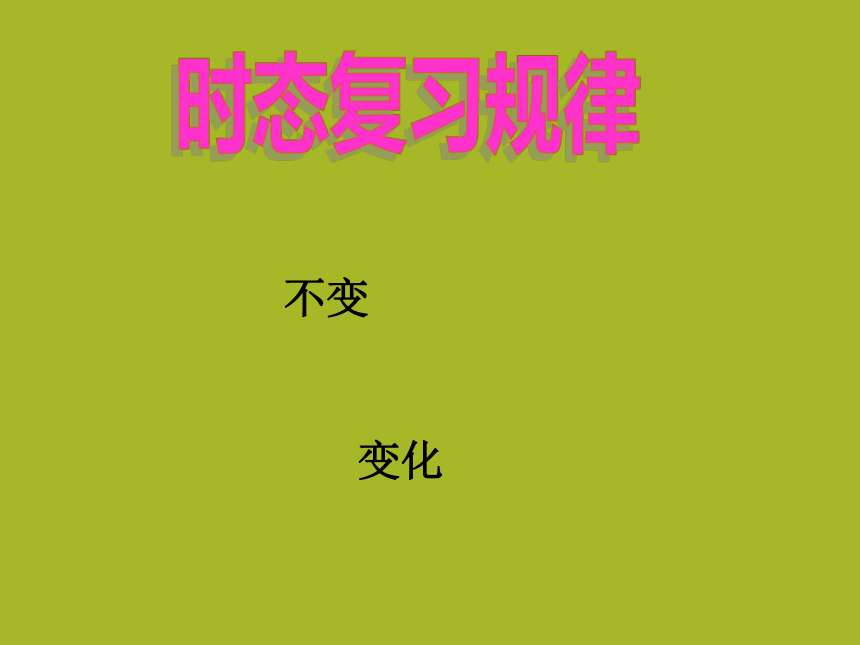
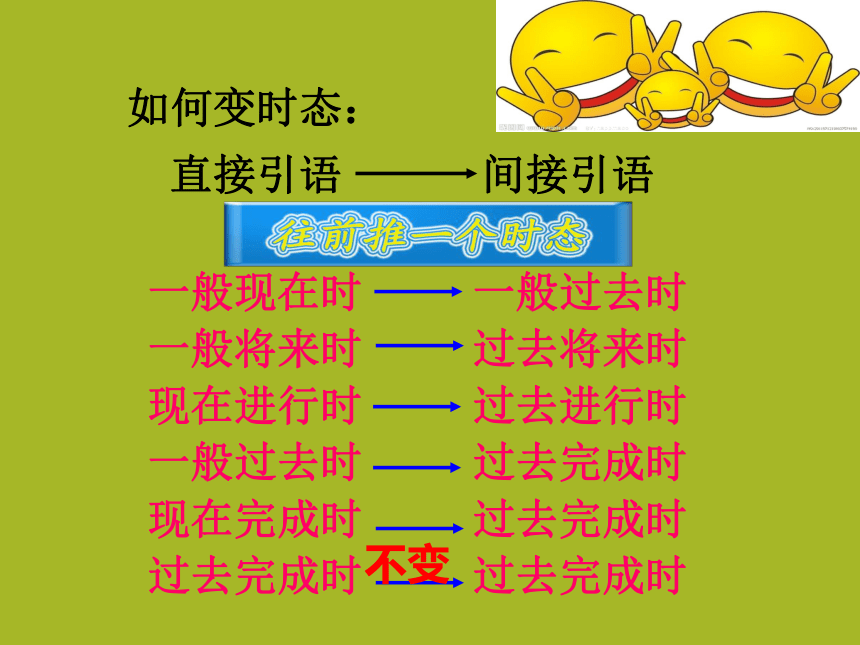
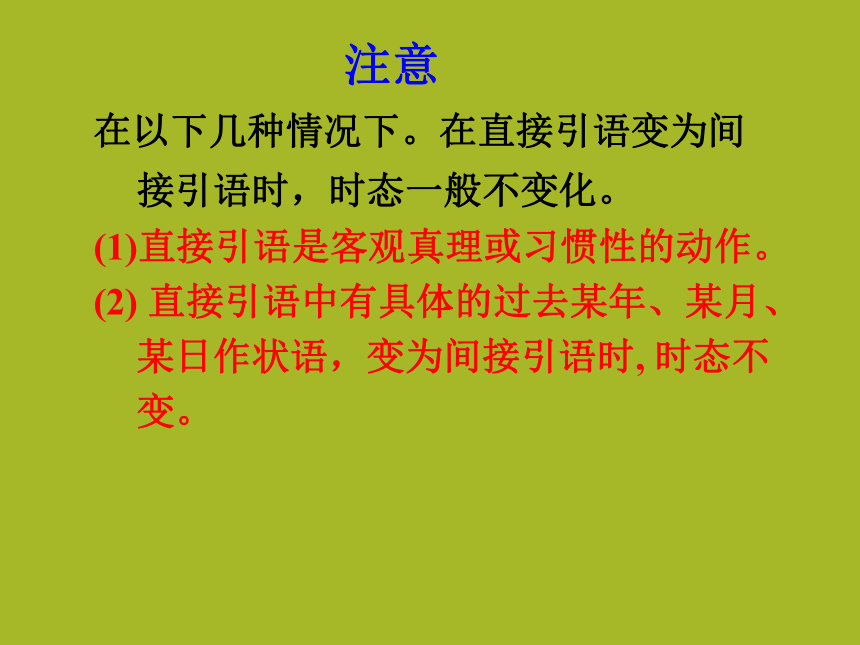

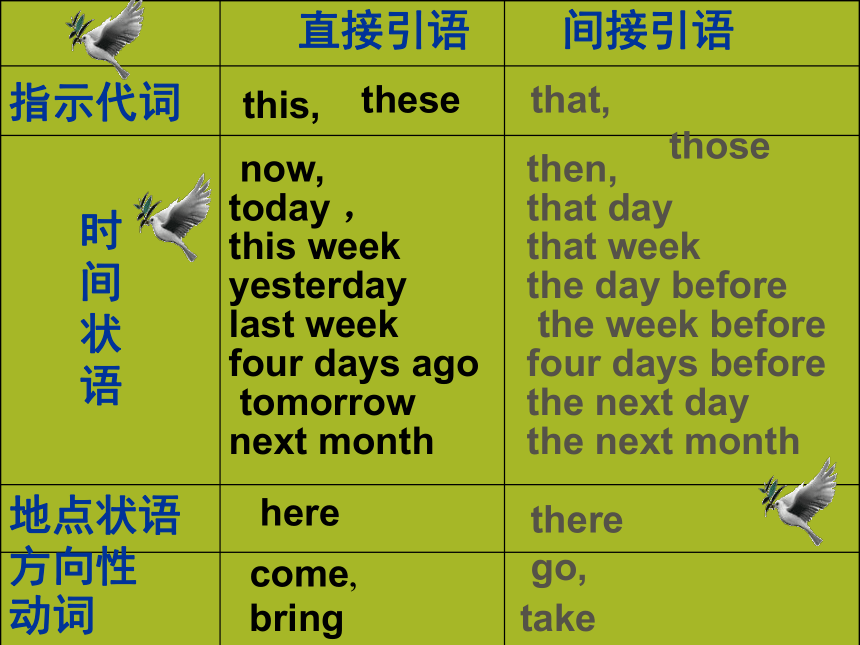
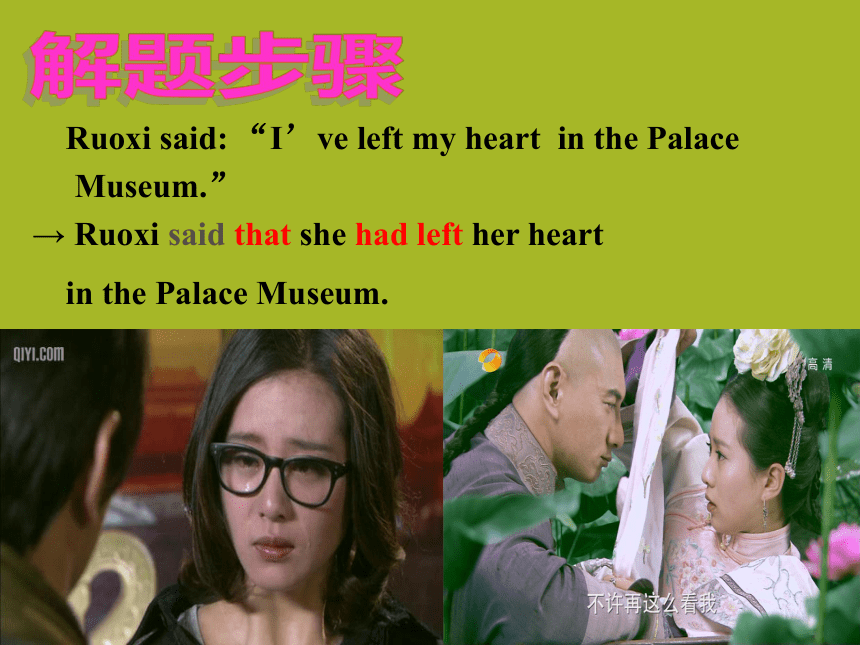
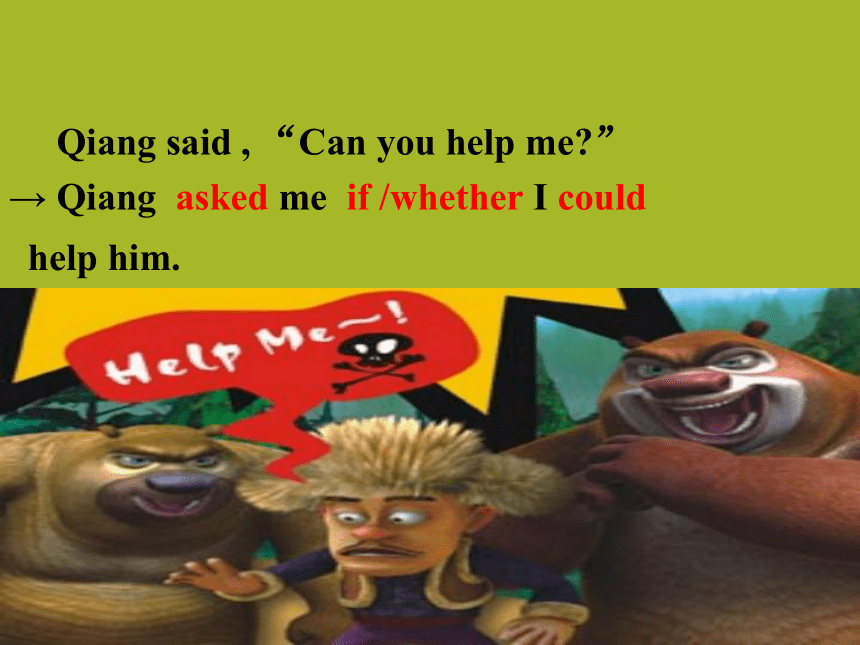
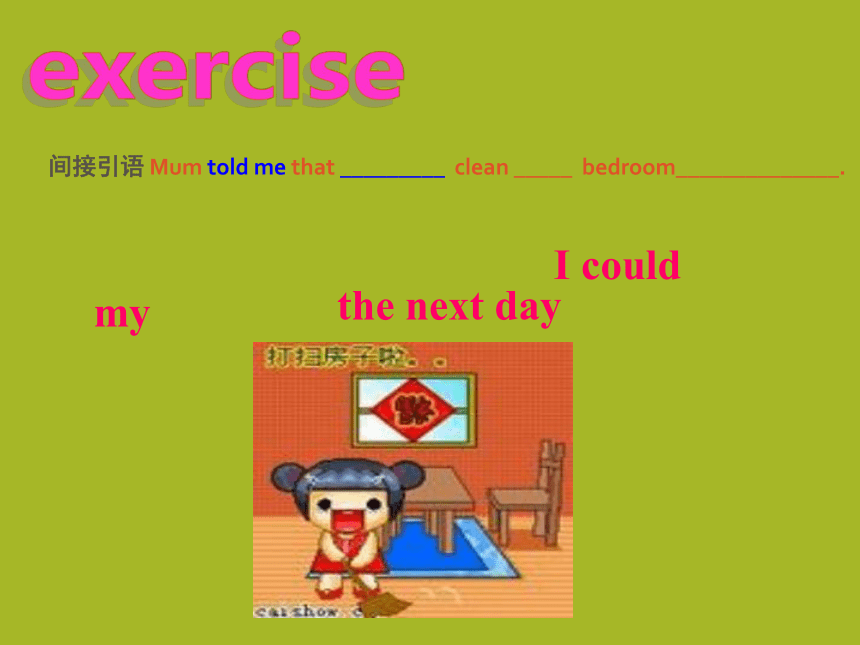
文档简介
(共50张PPT)
Unit
2
Direct
&
Indirect
Speech
Command
and
Request
How
can
we
change
direct
speech
into
indirect
speech
Four
steps
___________
___________
___________
___________
句型
人称
时态
其它
1.
陈述句的间接引语,连接词用____,
在
口语中可_____。引述动词用said,
told.
2.
一般疑问句或选择疑问句后连接词
用____________,引述动词用asked
.
注意_____语气。
3.
特殊疑问句用原句中的________作连接
词,改为_____语序。
that
省略
if/whether
陈述
疑问词
陈述
一随主、二随宾、
第三人称不更新
1)
主句为一般现在时(He
says)或一般将来时(he
will
say)的时候,间接引语时态_______。
2)当主句为过去(he
said)时,从句要跟着作相应的_______.
不变
变化
如何变时态:
直接引语
间接引语
一般现在时
一般将来时
现在进行时
一般过去时
现在完成时
过去完成时
一般过去时
过去将来时
过去进行时
过去完成时
过去完成时
过去完成时
不变
注意
在以下几种情况下。在直接引语变为间接引语时,时态一般不变化。
直接引语是客观真理或习惯性的动作。
(2)
直接引语中有具体的过去某年、某月、某日作状语,变为间接引语时,
时态不变。
直接引语
间接引语
指示代词
时
间
状
语
地点状语
方向性动词
this,
that,
these
those
now,
today
,
this
week
yesterday
last
week
four
days
ago
tomorrow
next
month
then,
that
day
that
week
the
day
before
the
week
before
four
days
before
the
next
day
the
next
month
here
there
come,
go,
bring
take
Ruoxi
said:
“I’ve
left
my
heart
in
the
Palace
Museum.”
→
Ruoxi
said
that
she
had
left
her
heart
in
the
Palace
Museum.
Qiang
said
,
“Can
you
help
me ”
→
Qiang
asked
me
if
/whether
I
could
help
him.
1.
Mum
said
to
me:“
You
can
clean
your
bedroom
tomorrow.”
间接引语
Mum
told
me
that
_________
clean
_____
bedroom______________.
I
could
my
the
next
day
2.
Mother
said,
“when
will
you
finish
your
homework ”
→Mother
asked
me
when
I
would
finish
my
homework.
本节课认知目标
祈使句如何变间接引语
以let’s
开头的祈使句如何变间接引语
用于表达命令,请求,劝告,警告,禁止等的句子。
表示请求、命令等的句子叫祈使句。
它的主语是听话人(you)
,
一般不需要说出来。
通常以动词原形开头。
祈使句末尾用惊叹号或句号,句子用降调。
Wash
the
clothes!
Please
wash
the
clothes!
Would
you
please
wash
the
clothes
not
polite
polite
very
polite
Usually,
giving
commands
is
less
polite
than
making
requests.
通常,发号施令比做出请求更没有礼貌。
Command(命令)
Request(请求)
Open
your
books.
Please
open
your
books.
Look
at
this
example.
Would
you
please
speak
more
slowly
command
request
(polite)
request
(polite)
Command
and
Request
command
Mother
told
Julia
to
get
up.
1.Mother
said,
“Get
up,
Julia”
Find
the
rules
2.“Would
you
like
to
see
my
flat ”
she
asked
She
asked
me
to
see
her
flat.
3.The
teacher
said,
"Don't
be
late
again,
Mary.”
The
teacher
told
Mary
not
to
be
late
again.
Rules
and
practice
of
direct
and
indirect
speech
当直接引语为祈使句时,转换为间接引语要用一个带动词不定式的简单句表示命令和请求。其结构是“动词
+
宾语
+
不定式”
结构
祈使句的直接引语
和间接引语
1.表示命令的祈使句的间接引语
句型:tell/order
sb.
(not)
to
do
sth
1)
“Open
the
door.”
he
said.
2)
“Put
up
your
hand.”
he
said.
He
told/ordered
me
to
open
the
door.
He
ordered/told
me
to
put
up
my
hand.
3)The
teacher
said
to
me,
“Come
in
.”
The
teacher
told
me
to
come
in
。
go
2.表示请求的祈使句的变成间接引语
句型:ask/beg
sb
(not)
to
do
sth
1)
“Please
open
your
book
.”
the
teacher
said.
The
teacher
asked
the
students
to
open
the
book.
2)
“Please
don’t
leave
me.”
she
said
to
him.
She
begged
him
not
to
leave
her.
3)
“Please
turn
off
the
lights
when
you
leave
the
classroom.”the
teacher
said
to
him.
The
teacher
asked
him
to
turn
off
the
lights
when
he
left
the
classroom.
3.表示请求的一般疑问句的间接引语
句型:ask/beg
sb
(not)
to
do
sth
1)“Would
you
please
open
the
window?”he
said.
He
asked
me
to
open
the
window.
2)
“
May
I
borrow
your
pen?”
he
said.
He
asked
me
to
lend
him
my
pen.
4.
直接引语是表示建议的祈使句:
He
said,
“Let’s
go
to
the
cinema.”
He
suggested
going
to
the
cinema.
He
suggested
that
we
should
go
to
the
cinema.
He
advised
us
to
go
to
the
cinema.
He
advised
that
we
should
go
to
the
cinema.
(suggest)
(advise)
直接引语是表示建议的祈使句,
变间接引语时,可以用advise,suggest
等词转叙。
suggest
doing
sth
suggest
that
sb
(should)
do
sth
advise
sb
to
do
sth
advise
that
sb
(should)
do
sth
直接引语
(变化前)
间接引语(变化后)
感叹句
He
said:
“How
happy
I
am!”
that/what/how引导的宾语从句
He
said
that
he
was
very
happy.
He
said
how
happy
he
was.
一改二变三加四去
一改:said
(to)
改为asked或told,
ordered等
二变:said
to
的宾语或呼语变为asked等的宾语
三加:即在动词原形前加to,使成为动词不定式
四去:去掉please
She
asked
me
to
see
her
flat.
“Would
you
please
see
my
flat ”
she
asked
ask
sb
to
do
sth
Mother
told
Julia
to
get
up.
Mother
said,
“Get
up,
Julia”
tell
sb
to
do
sth
The
officer
said
to
us,"
go
away.”
The
officer
ordered
/commanded
us
to
go
away.
order/command
sb
to
do
sth
The
teacher
told/ordered/command
Mary
not
to
be
late
again.
The
teacher
said,
"Don't
be
late
again,
Mary.”
tell
/order/command
sb
not
to
do
sth
Huahua
said,
“let’s
go
swimming.”
→Huahua
suggested
going
swimming.
或
Huahua
suggested
that
they
(should
)
go
swimming.
“Let’s
go
camping
this
weekend,”
Tom
said
to
us.
→
Tom
suggested
___________
that
weekend.
→
Tom
suggested
that
_______________
__________
that
weekend.
going
camping
we
(should)
go
camping
1.
“Please
close
the
window,”
he
said
to
me.
→He
______
me
_____
the
window.
A.
said
to;
to
close
B.
told
to;
closing
C.
asked;
to
close
D.
said
to;
please
close
C
2.
He
said,
“Don’t
do
that
again.”
He
_____
me
_______
that
again.
A.
said
to
me;
not
to
do
B.
said
to
me;
don’t
do
C.
told
me;
don’t
do
D.
told
me;
not
to
do
D
3.
“Don’t
put
it
on
my
hat.”his
wife
said
to
him.
His
wife
told
him
____
put
it
on
___hat.
A.
don’t,
his
B.
don’t,
her
C.
not
to,
his
D.
not
to,
her
D
4.
Rose
asked
Tom,
“Did
you
see
my
purse ”
Rose
asked
Tom
_____.
A.
whether
that
he
had
seen
her
purse
B.
whether
he
had
seen
her
purse
C.
that
whether
he
had
seen
her
purse
D.
that
if
he
has
seen
her
purse
B
5.
He
asked
me
________
with
me.
A.
what
the
matter
is
B.
what
the
mater
was
C.
what’s
the
matter
D.
what
was
the
matter
D
解析:
如果直接引语是“What’s
the
matter ”
“What’s
wrong ”
“What’s
the
trouble ”,
变间接引语时语序不变。
6.
He
asked,
“Are
you
a
Party
member
or
a
League
member ”
→He
asked
me
______.
A.
am
I
a
Party
member
or
a
League
member
B.
was
I
a
Party
member
or
a
League
member
C.
if
I
was
a
Party
member
or
a
League
member
D.
whether
was
I
a
Party
member
or
a
League
member
C
解析:
选择疑问句要变成whether
或if引导的宾语从句。
7.
“You’ve
already
got
well,
haven’t
you ”
she
asked.
→She
asked
_______.
A.
if
I
have
already
got
well,
hadn’t
you
B.
whether
I
had
already
got
well
C.
have
I
already
got
well
D.
had
I
already
got
well.
解析:
反意疑问句要变成whether或
if
引导的宾语从句。
B
8.
He
asked
______
for
the
computer.
did
I
pay
how
much
B.
I
paid
how
much
C.
how
much
did
I
pay
D.
how
much
I
paid
D
9.
Tom
asked
Jack
_____.
A.
why
he
was
so
excited
B.
why
was
he
so
excited
C.
why
is
he
so
excited
D.
why
he
is
so
excited
A
10.
The
boy
said,
“May
I
go
along
with
you ”
The
boy
asked
me
____.
A.
if
I
might
go
along
with
you
B.
if
he
might
go
along
with
you
C.
if
he
might
go
along
with
me
D.
if
he
might
go
along
with
the
boy
D
11.
He
said,
“Mother,
the
boy
is
very
naughty.”
→He
____
very
naughty.
A.
said
his
mother
that
the
boy
was
B.
said
to
his
mother
that
the
boy
is
C.
told
his
mother
that
the
boy
was
D.
spoke
to
his
mother
that
the
boy
was
D
12.
“Have
you
seen
the
film ”
he
asked
me.
→He
asked
me
_______.
A.
had
I
seen
the
film
B.
have
I
seen
the
film
C.
if
I
have
seen
the
film
D.
whether
I
had
seen
the
film
D
13.
“Please
close
the
window,
”
he
said
to
me.
→He
______
me
_____
the
window.
A.
said
to;
to
close
B.
told
to;
closing
C.
asked;
to
close
D.
said
to;
please
close
C
14.
“I
am
a
teacher,
”
Jack
said.
→He
said
_____.
A.
that
I
am
a
teacher
B.
I
was
a
teacher
C.
that
he
is
a
teacher
D.
he
was
a
teacher
D
15.
The
teacher
asked
us
____
so
much
noise.
A.
don’t
make
B.
not
make
C.
not
making
D.
not
to
make
16.
Visitors
____
not
to
touch
the
exhibits.
A.
will
request
B.
request
C.
are
requesting
D.
are
requested
D
D
2.
“be
quiet!”
Miss
Helen
said
to
the
noisy
boys.
→__________________________________
_____________________.
Miss
Helen
commanded
/ordered
the
noisy
boys
to
be
quiet
Fun
Time
It
is
said
that
there
are
two
robots.
One
is
called
“slave
robot”,
who
can
only
hear
commands,
the
other
is
called
“friend
robot”,
who
can
only
respond
to
request.
If
you
give
correct
requests
or
commands,
they
will
do
whatever
you
have
them
do.
Believe
it
or
not!
Let’s
have
a
try!!!!!
Finish
the
exercise
on
your
paper
Review
the
knowledge
of
this
class.
Unit
2
Direct
&
Indirect
Speech
Command
and
Request
How
can
we
change
direct
speech
into
indirect
speech
Four
steps
___________
___________
___________
___________
句型
人称
时态
其它
1.
陈述句的间接引语,连接词用____,
在
口语中可_____。引述动词用said,
told.
2.
一般疑问句或选择疑问句后连接词
用____________,引述动词用asked
.
注意_____语气。
3.
特殊疑问句用原句中的________作连接
词,改为_____语序。
that
省略
if/whether
陈述
疑问词
陈述
一随主、二随宾、
第三人称不更新
1)
主句为一般现在时(He
says)或一般将来时(he
will
say)的时候,间接引语时态_______。
2)当主句为过去(he
said)时,从句要跟着作相应的_______.
不变
变化
如何变时态:
直接引语
间接引语
一般现在时
一般将来时
现在进行时
一般过去时
现在完成时
过去完成时
一般过去时
过去将来时
过去进行时
过去完成时
过去完成时
过去完成时
不变
注意
在以下几种情况下。在直接引语变为间接引语时,时态一般不变化。
直接引语是客观真理或习惯性的动作。
(2)
直接引语中有具体的过去某年、某月、某日作状语,变为间接引语时,
时态不变。
直接引语
间接引语
指示代词
时
间
状
语
地点状语
方向性动词
this,
that,
these
those
now,
today
,
this
week
yesterday
last
week
four
days
ago
tomorrow
next
month
then,
that
day
that
week
the
day
before
the
week
before
four
days
before
the
next
day
the
next
month
here
there
come,
go,
bring
take
Ruoxi
said:
“I’ve
left
my
heart
in
the
Palace
Museum.”
→
Ruoxi
said
that
she
had
left
her
heart
in
the
Palace
Museum.
Qiang
said
,
“Can
you
help
me ”
→
Qiang
asked
me
if
/whether
I
could
help
him.
1.
Mum
said
to
me:“
You
can
clean
your
bedroom
tomorrow.”
间接引语
Mum
told
me
that
_________
clean
_____
bedroom______________.
I
could
my
the
next
day
2.
Mother
said,
“when
will
you
finish
your
homework ”
→Mother
asked
me
when
I
would
finish
my
homework.
本节课认知目标
祈使句如何变间接引语
以let’s
开头的祈使句如何变间接引语
用于表达命令,请求,劝告,警告,禁止等的句子。
表示请求、命令等的句子叫祈使句。
它的主语是听话人(you)
,
一般不需要说出来。
通常以动词原形开头。
祈使句末尾用惊叹号或句号,句子用降调。
Wash
the
clothes!
Please
wash
the
clothes!
Would
you
please
wash
the
clothes
not
polite
polite
very
polite
Usually,
giving
commands
is
less
polite
than
making
requests.
通常,发号施令比做出请求更没有礼貌。
Command(命令)
Request(请求)
Open
your
books.
Please
open
your
books.
Look
at
this
example.
Would
you
please
speak
more
slowly
command
request
(polite)
request
(polite)
Command
and
Request
command
Mother
told
Julia
to
get
up.
1.Mother
said,
“Get
up,
Julia”
Find
the
rules
2.“Would
you
like
to
see
my
flat ”
she
asked
She
asked
me
to
see
her
flat.
3.The
teacher
said,
"Don't
be
late
again,
Mary.”
The
teacher
told
Mary
not
to
be
late
again.
Rules
and
practice
of
direct
and
indirect
speech
当直接引语为祈使句时,转换为间接引语要用一个带动词不定式的简单句表示命令和请求。其结构是“动词
+
宾语
+
不定式”
结构
祈使句的直接引语
和间接引语
1.表示命令的祈使句的间接引语
句型:tell/order
sb.
(not)
to
do
sth
1)
“Open
the
door.”
he
said.
2)
“Put
up
your
hand.”
he
said.
He
told/ordered
me
to
open
the
door.
He
ordered/told
me
to
put
up
my
hand.
3)The
teacher
said
to
me,
“Come
in
.”
The
teacher
told
me
to
come
in
。
go
2.表示请求的祈使句的变成间接引语
句型:ask/beg
sb
(not)
to
do
sth
1)
“Please
open
your
book
.”
the
teacher
said.
The
teacher
asked
the
students
to
open
the
book.
2)
“Please
don’t
leave
me.”
she
said
to
him.
She
begged
him
not
to
leave
her.
3)
“Please
turn
off
the
lights
when
you
leave
the
classroom.”the
teacher
said
to
him.
The
teacher
asked
him
to
turn
off
the
lights
when
he
left
the
classroom.
3.表示请求的一般疑问句的间接引语
句型:ask/beg
sb
(not)
to
do
sth
1)“Would
you
please
open
the
window?”he
said.
He
asked
me
to
open
the
window.
2)
“
May
I
borrow
your
pen?”
he
said.
He
asked
me
to
lend
him
my
pen.
4.
直接引语是表示建议的祈使句:
He
said,
“Let’s
go
to
the
cinema.”
He
suggested
going
to
the
cinema.
He
suggested
that
we
should
go
to
the
cinema.
He
advised
us
to
go
to
the
cinema.
He
advised
that
we
should
go
to
the
cinema.
(suggest)
(advise)
直接引语是表示建议的祈使句,
变间接引语时,可以用advise,suggest
等词转叙。
suggest
doing
sth
suggest
that
sb
(should)
do
sth
advise
sb
to
do
sth
advise
that
sb
(should)
do
sth
直接引语
(变化前)
间接引语(变化后)
感叹句
He
said:
“How
happy
I
am!”
that/what/how引导的宾语从句
He
said
that
he
was
very
happy.
He
said
how
happy
he
was.
一改二变三加四去
一改:said
(to)
改为asked或told,
ordered等
二变:said
to
的宾语或呼语变为asked等的宾语
三加:即在动词原形前加to,使成为动词不定式
四去:去掉please
She
asked
me
to
see
her
flat.
“Would
you
please
see
my
flat ”
she
asked
ask
sb
to
do
sth
Mother
told
Julia
to
get
up.
Mother
said,
“Get
up,
Julia”
tell
sb
to
do
sth
The
officer
said
to
us,"
go
away.”
The
officer
ordered
/commanded
us
to
go
away.
order/command
sb
to
do
sth
The
teacher
told/ordered/command
Mary
not
to
be
late
again.
The
teacher
said,
"Don't
be
late
again,
Mary.”
tell
/order/command
sb
not
to
do
sth
Huahua
said,
“let’s
go
swimming.”
→Huahua
suggested
going
swimming.
或
Huahua
suggested
that
they
(should
)
go
swimming.
“Let’s
go
camping
this
weekend,”
Tom
said
to
us.
→
Tom
suggested
___________
that
weekend.
→
Tom
suggested
that
_______________
__________
that
weekend.
going
camping
we
(should)
go
camping
1.
“Please
close
the
window,”
he
said
to
me.
→He
______
me
_____
the
window.
A.
said
to;
to
close
B.
told
to;
closing
C.
asked;
to
close
D.
said
to;
please
close
C
2.
He
said,
“Don’t
do
that
again.”
He
_____
me
_______
that
again.
A.
said
to
me;
not
to
do
B.
said
to
me;
don’t
do
C.
told
me;
don’t
do
D.
told
me;
not
to
do
D
3.
“Don’t
put
it
on
my
hat.”his
wife
said
to
him.
His
wife
told
him
____
put
it
on
___hat.
A.
don’t,
his
B.
don’t,
her
C.
not
to,
his
D.
not
to,
her
D
4.
Rose
asked
Tom,
“Did
you
see
my
purse ”
Rose
asked
Tom
_____.
A.
whether
that
he
had
seen
her
purse
B.
whether
he
had
seen
her
purse
C.
that
whether
he
had
seen
her
purse
D.
that
if
he
has
seen
her
purse
B
5.
He
asked
me
________
with
me.
A.
what
the
matter
is
B.
what
the
mater
was
C.
what’s
the
matter
D.
what
was
the
matter
D
解析:
如果直接引语是“What’s
the
matter ”
“What’s
wrong ”
“What’s
the
trouble ”,
变间接引语时语序不变。
6.
He
asked,
“Are
you
a
Party
member
or
a
League
member ”
→He
asked
me
______.
A.
am
I
a
Party
member
or
a
League
member
B.
was
I
a
Party
member
or
a
League
member
C.
if
I
was
a
Party
member
or
a
League
member
D.
whether
was
I
a
Party
member
or
a
League
member
C
解析:
选择疑问句要变成whether
或if引导的宾语从句。
7.
“You’ve
already
got
well,
haven’t
you ”
she
asked.
→She
asked
_______.
A.
if
I
have
already
got
well,
hadn’t
you
B.
whether
I
had
already
got
well
C.
have
I
already
got
well
D.
had
I
already
got
well.
解析:
反意疑问句要变成whether或
if
引导的宾语从句。
B
8.
He
asked
______
for
the
computer.
did
I
pay
how
much
B.
I
paid
how
much
C.
how
much
did
I
pay
D.
how
much
I
paid
D
9.
Tom
asked
Jack
_____.
A.
why
he
was
so
excited
B.
why
was
he
so
excited
C.
why
is
he
so
excited
D.
why
he
is
so
excited
A
10.
The
boy
said,
“May
I
go
along
with
you ”
The
boy
asked
me
____.
A.
if
I
might
go
along
with
you
B.
if
he
might
go
along
with
you
C.
if
he
might
go
along
with
me
D.
if
he
might
go
along
with
the
boy
D
11.
He
said,
“Mother,
the
boy
is
very
naughty.”
→He
____
very
naughty.
A.
said
his
mother
that
the
boy
was
B.
said
to
his
mother
that
the
boy
is
C.
told
his
mother
that
the
boy
was
D.
spoke
to
his
mother
that
the
boy
was
D
12.
“Have
you
seen
the
film ”
he
asked
me.
→He
asked
me
_______.
A.
had
I
seen
the
film
B.
have
I
seen
the
film
C.
if
I
have
seen
the
film
D.
whether
I
had
seen
the
film
D
13.
“Please
close
the
window,
”
he
said
to
me.
→He
______
me
_____
the
window.
A.
said
to;
to
close
B.
told
to;
closing
C.
asked;
to
close
D.
said
to;
please
close
C
14.
“I
am
a
teacher,
”
Jack
said.
→He
said
_____.
A.
that
I
am
a
teacher
B.
I
was
a
teacher
C.
that
he
is
a
teacher
D.
he
was
a
teacher
D
15.
The
teacher
asked
us
____
so
much
noise.
A.
don’t
make
B.
not
make
C.
not
making
D.
not
to
make
16.
Visitors
____
not
to
touch
the
exhibits.
A.
will
request
B.
request
C.
are
requesting
D.
are
requested
D
D
2.
“be
quiet!”
Miss
Helen
said
to
the
noisy
boys.
→__________________________________
_____________________.
Miss
Helen
commanded
/ordered
the
noisy
boys
to
be
quiet
Fun
Time
It
is
said
that
there
are
two
robots.
One
is
called
“slave
robot”,
who
can
only
hear
commands,
the
other
is
called
“friend
robot”,
who
can
only
respond
to
request.
If
you
give
correct
requests
or
commands,
they
will
do
whatever
you
have
them
do.
Believe
it
or
not!
Let’s
have
a
try!!!!!
Finish
the
exercise
on
your
paper
Review
the
knowledge
of
this
class.
